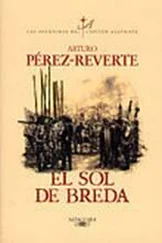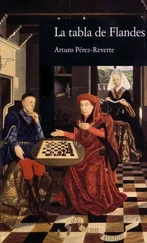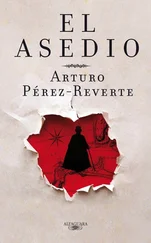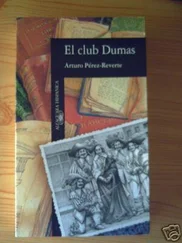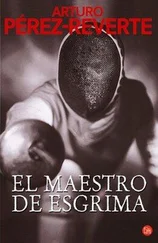Arturo Pérez-Reverte - The Sun Over Breda
Здесь есть возможность читать онлайн «Arturo Pérez-Reverte - The Sun Over Breda» весь текст электронной книги совершенно бесплатно (целиком полную версию без сокращений). В некоторых случаях можно слушать аудио, скачать через торрент в формате fb2 и присутствует краткое содержание. Жанр: Старинная литература, на английском языке. Описание произведения, (предисловие) а так же отзывы посетителей доступны на портале библиотеки ЛибКат.
- Название:The Sun Over Breda
- Автор:
- Жанр:
- Год:неизвестен
- ISBN:нет данных
- Рейтинг книги:5 / 5. Голосов: 1
-
Избранное:Добавить в избранное
- Отзывы:
-
Ваша оценка:
- 100
- 1
- 2
- 3
- 4
- 5
The Sun Over Breda: краткое содержание, описание и аннотация
Предлагаем к чтению аннотацию, описание, краткое содержание или предисловие (зависит от того, что написал сам автор книги «The Sun Over Breda»). Если вы не нашли необходимую информацию о книге — напишите в комментариях, мы постараемся отыскать её.
The Sun Over Breda — читать онлайн бесплатно полную книгу (весь текст) целиком
Ниже представлен текст книги, разбитый по страницам. Система сохранения места последней прочитанной страницы, позволяет с удобством читать онлайн бесплатно книгу «The Sun Over Breda», без необходимости каждый раз заново искать на чём Вы остановились. Поставьте закладку, и сможете в любой момент перейти на страницу, на которой закончили чтение.
Интервал:
Закладка:
“I believed,” was Bragado’s last comment, “that I was dealing with Spaniards, not Germans.”
That cutting remark had the desired effect, and the men shifted uneasily in their chairs as they heard Garrote mutter “’Sblood,” as if someone had maligned his mother. At that, Diego Alatriste’s pale green eyes showed the spark of a smile. That insult always worked a miracle; no further word of protest was heard among the veteran soldiers seated at the table, and the officer, now relaxed, was seen to return Alatriste’s hint of a smile. Old dog to old dog.
“Your Mercies must leave immediately,” Bragado said, ending the discussion.
Alatriste again stroked his mustache with two fingers. Then he turned to his comrades. “You heard the captain,” he said.
The men began to get to their feet, Garrote grumbling, the others resigned. Sebastián Copons—small, thin, knotted, and tough as an aged grapevine—had been on his feet for some time, buckling on his weapons without awaiting orders from anyone, as if all the delays, all the unpaid wages, even the very treasure of the king of Persia, all led him to this miserable day: he, a fatalist, like the Moors whose necks were being cut by his marauding ancestors a few centuries earlier. Diego Alatriste watched him put on his hat and cape and go outside to notify other soldiers of the squad who were quartered in the house next door. They had been together through many campaigns, from the days of Ostend to Fleurus and now Breda, and in all those years no one had heard more than thirty words from him.
“’Pon my soul, I almost forgot this,” Bragado exclaimed.
He had picked up the jar of wine and was draining it, all the time eyeing the Flemish woman, who was cleaning scraps from the table. Without interrupting his drinking, holding the jug high, he dug into his doublet, pulled out a letter, and handed it to Diego Alatriste.
“This came for you a week ago.”
The missive was closed with sealing wax, and raindrops had slightly smeared the ink of the address. Alatriste read the name of the sender on the back: From don Francisco de Quevedo Villegas, La Bardiza Inn, Madrid.
As the woman passed by Alatriste without looking at him, one of her firm full breasts brushed against him. Steel glinted as it was slipped into scabbards, and well-oiled leather gleamed. Alatriste picked up his buffcoat and slowly belted it before asking for the baldric with his sword and dagger. Outside, rain continued to beat against the windowpanes.
“Two prisoners at least,” Bragado insisted.
The men were ready: mustaches, beards, hats, folds of waxed capes covered with mended tears and clumsy patches; light arms, appropriate for the job they were about to do; no muskets or pikes or other impediments, only good and simple steel: swords and daggers from Toledo, Sahagún, Milan, and Biscay. Also an occasional pistol poked out of the wearer’s clothing, but it would be useless with powder saturated by so much rain. Between them they also had a few crusts of bread and some rope to tie up Hollanders. And those empty, indifferent gazes of old soldiers prepared to face the hazards of their office once again before one day returning to their homeland marked by a crazy quilt of scars, with no bed to lie in or wine to drink and no hearth for baking their bread. And if they didn’t achieve this, they would be what in soldier’s cant were called terratenientes , landowners, claiming five feet of hard-fought Flemish soil in which they would find eternal sleep, with a hymn in praise of Spain forever on their lips.
Bragado finished his wine. Diego Alatriste accompanied him to the door, and the officer left without further conversation: no exchanges, no good-byes. The men watched their commander ride off down the dike on the back of his old field horse, crossing paths with Sebastián Copons, who was on his way back to the house.
Alatriste felt the woman’s eyes on him, but he did not turn to look at her. Without explaining whether they were parting only for hours or forever, he pushed open the door and went out into the rain, immediately feeling water through the cracked soles of his boots. The wetness seeped into the marrow of his bones, stirring the aches of old wounds. He sighed quietly and began to walk, hearing his companions splashing through the mud behind him, following him in the direction of the dike where Copons was standing as motionless as a small, strong statue beneath the steady downpour.
“What a cesspool of a life,” someone muttered.
And without further words, with heads lowered, wrapped in their soaked capes, the line of Spaniards faded into the gray landscape.
From don Francisco de Quevedo Villegas to don Alatriste y Tenorio * Tercio Viejo de Cartagena * Military post of Flanders
I hope, my esteemed captain, that upon receipt of the present you are, Y.M., healthy and of one piece.
In regard to my own condition, I am writing to you having recently emerged from an abominable flux of humors that, evincing itself in fevers, had laid me low for several days. Now, thanks to a merciful God, I am fine and can send you both my constant affection and my greetings. I hazard that you are deeply engaged in the affair at Breda, which is a business that buzzes from mouth to mouth at Court because of its importance to the future of our monarchy and to the Catholic faith, and also because it is said that the military machine set in motion has seen no equal since the days when Julius Caesar besieged Alesia. Here it is ventured that the stronghold will be definitively won from the Dutch and that it will fall like a ripe plum…although there is always someone who points out that don Ambrosio Spínola is taking his time and that ripe fruit must be eaten in season or it becomes full of worms. Whatever the case, since you have never lacked a sturdy heart, I wish you good fortune in the assaults, trenches, mines, countermines, and other diabolical inventions that keep you engaged in such clamorous affairs. Once, I heard Y.M. say that war is clean, and I understood your argument fully, to the point that at times I cannot but consider you to be correct. Here in La Villa y Corte, our city of Madrid, the enemy does not wear breastplate and helmet but, rather, toga, cassock, or silk doublet, and he never attacks face on but prefers ambush. In that particular, please know that everything is as it has always been, only worse. I have faith still in the intent of the conde-duque, but I fear that not even his desires will prevail. We Spanish have fewer tears than reasons to weep, for it is a vain labor to offer light to the blind, words to the deaf, science to the ignorant, and honor to monarchs. Here the same types continue to flourish: the blond and powerful caballero is still soldier, horse, and king in any matter, and he who is honest does naught but harm himself. As for me, I continue to make no progress in my eternal suit concerning the Torre de Juan Abad, each day battling this wretched and venal legal system and its practitioners that God, weary of confining monstrosities to hell, instead visits upon us. And I assure you, Capitán, that never before have I found myself among such toads as those in the Providencia square. And regarding that subject, please allow me to regale you with a sonnet inspired by my recent calamities:
You scatter judgments like grain tossed to geese, selling the law you do not comprehend, dispensing only what brings you gold, and coveting, more than Jason, the Golden Fleece.
Both rights divine and those of mortal man in your interpretation are debased, and whether you are cruel, or affect grace, each sentence is shrewdly tailored to your plan
Читать дальшеИнтервал:
Закладка:
Похожие книги на «The Sun Over Breda»
Представляем Вашему вниманию похожие книги на «The Sun Over Breda» списком для выбора. Мы отобрали схожую по названию и смыслу литературу в надежде предоставить читателям больше вариантов отыскать новые, интересные, ещё непрочитанные произведения.
Обсуждение, отзывы о книге «The Sun Over Breda» и просто собственные мнения читателей. Оставьте ваши комментарии, напишите, что Вы думаете о произведении, его смысле или главных героях. Укажите что конкретно понравилось, а что нет, и почему Вы так считаете.

